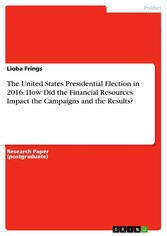Suchen und Finden
Service

The United States Presidential Election in 2016. How Did the Financial Resources Impact the Campaigns and the Results?
Lioba Frings
Verlag GRIN Verlag , 2020
ISBN 9783346093714 , 22 Seiten
Format PDF
Kopierschutz frei
Geräte
Mehr zum Inhalt

The United States Presidential Election in 2016. How Did the Financial Resources Impact the Campaigns and the Results?
Research Paper (postgraduate) from the year 2017 in the subject Politics - Region: USA, grade: 2.7, University of Bonn, language: English, abstract: This paper focuses on the analysis of financial resources such as fundraising and personal net worth in conjunction with media coverage as well as other aspects and the impact of money on the presidential elections in 2016. Money is an essential necessity in order to make a political campaign successful as it contributes to the name recognition of a candidate even more when the respective candidate has access to sufficient resources and thereby more access to voters than candidates with less financial resources and less financial contributions by others. In the 2016 presidential election process two well-known candidates have been nominated. Both already previously have made their mark and have become prominent members of the American society and media sphere. The impact of finances in political processes is of interest to both scholars and laymen. Two major issues are mostly being focused on: 'the sources of campaign contributions' and 'the impact of campaign contributions on electoral outcomes', meaning the relationship betweeen fundraising and the success within the respective election. The correlation between the number of votes and expenditures is crucial to the process of voting: 'if campaign expenditures do not translate into votes, then expenditures are irrelevant'. Since candidates are eager to raise more money than all the other candidates and since the public contributes to a candidate's finances, money must matter within the framework of political elections, otherwise money would be ignored and not raised. It has been found that electoral outcomes are influenced by four factors: 'campaign expenditures, incumbency, party strength, and idiosyncratic factors', which are campaign styles, scandals, local issues and other factors. While generally higher expenditures lead to more votes, additional expenditures after having convinced apathetic supporters do not have a significant effect anymore, which means campaign expenditures function according to the principle of diminishing marginal returns.
Shop

